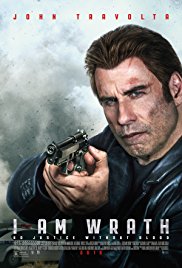
I AM WRATH
US, 2016, 92 minutes, Colour.
John Travolta, Christopher Meloni, Amanda Schull, Sam Trammell, Patrick St. Esprit, Rebecca de Mornay, Asante Jones, Paul Sloan, Luis Da Silva Jr.
Directed by Chuck Russell.
In the past Charles Bronson made a number of films like this one, especially the Death Wish series.
This time it is John Travolta (looking uncomfortable with a two-tightly fitting wig) who suffers the death of his wife, a cameo by Rebecca to Mornay, who is an expert getting information about the feasibility of a pipeline for the city of Columbus, Ohio. He is an engineer without work – but, as revealed, he has a past with Black capped Ops operations.
At first, he thinks it is is part of the cream crime wave in the city which the introduction shows has proliferating with a collage of television news information. The governor says the crime wave is a lessening.
Stanley goes to the police, is interrogated, identifies one of the assailants who had hit him, but the man is let go, the police not seeming to interested. Stanley makes connection with his past partner, Christopher Maloney in a strong performance, and it is clear that the rest of the film will be tracking down the criminals, in quite a complex investigation, confrontations, drug lords, sleazy clubs, martial arts fights, weapons, shootouts, threats to the daughter and her husband, and a build up to a confrontation with the governor himself.
In many ways, the screenplay is one of those which has its cake and eat it – a full on vigil anti-film with violence, the audience emotionally identifying with the grieving husband while dismayed at his methods, and are seen in a church, with a priest, a quotation from the book of Jeremiah where God says “I am wrath�, the story of the forgiveness of the good thief and a confession.
The film is directed by Chuck Russell who made a number of action films in the 1990s and early 20th century including Eraser.
1. A revenge story? Prevalence of crime in American cities? Drug crime? Political crime? Corrupt police?
2. Columbus Ohio, the city, the governor and his mansion, speeches, plans for the pipeline? Homes? Airport, parking area, murder? The drug centres? Clubs? The barbershop – in the private arsenal? The musical score?
3. The introduction, the television news items, the prevalence of crime, brutality? The governor boasting that crime was down? The ultimate irony about his role?
4. Environmental issues, the pipeline, companies? Murder to suppress reports?
5. The title, the quotation from Jeremiah, God says that I am wrath and I will not hold it in…? The priest giving the Bible to Stanley, the Bible flung, open, Stanley reading the text? Motivation? And the tattoo on his back?
6. Stanley’s wife and her research, the report, not in favour with the governor? Meeting stand, his job application, engineering, unemployed? The later revelation of his Black Ops career? In the car park, they’re being accosted, the wife murdered, Stanley injured, recognising the assailant?,
7. The police, the interrogation, treatment of Stanley, the question is, Is recognising the assailant – and then seeing the man set free? The reaction of the police, Stanley saying he left it to the police?
8. Stanley, his grief, the farewell to his wife, in the church, his daughter? The talk with the priest, not wanting to stay for the funeral, his lack of belief – the sympathetic priest, the talk, giving him the Bible and the Rosary? Stanley later returning to the church after some of the killings, his reflection, the priest, the discussion about confession and forgiveness, the story of the good thief offered Paradise, Stanley and his confession?
9. The contact with Dennis, their past career, Dennis and his barbershop, the shave, Stanley having pulled out of the job, Dennis’s reaction, trust? Getting the information about the assailants? Dennis warning Stanley about becoming involved?
10. Stanley, his revenge, confronting the criminals, getting the information about the drug dealer, going to the tattoo parlour, Lars coming, the confrontation, his death, the drugs and taking them? The identification of Charlie? Meeting at the Seoul club? Dennis, surveillance, information, the VP room? Stanley coming in, the confrontation, the people in the club, the bodyguards, the proprietor, the killings? Dennis saving Stanley? The time limit to get the final information?
11. The drug chief, connections with the police, with the governor, the photo of the governor’s son, the blackmail? The drugs and wanting them back?
12. The men confronting Stanley and Dennis, their Black Ops skills and fights? The trashing of the barbershop and the consequent confrontation?
13. Stanley’s daughter, her son, the car pursuing them and shooting, her husband wounded? Confronting her father? Seeing the information and the gun on his desk?
14. The drug chief, coming to the home, the death of the babysitter? Getting the daughter to call her father? His reading the code, contacting Dennis? The confrontation in the house, the deaths?
15. The contact with the police, explaining things away, Stanley putting the detective in the boot of the car, going to the governor’s mansion? The background of the governor, the reports, his socialising, public image, his story about rising from nothing? His ruthlessness with the police?
16. Going into the grounds, Stanley setting the bomb on the car, Gibson being killed? Stanley going to the house, the elimination of the guards, the confrontation with the governor, his rifle, the fight? Going out, his being shot?
17. The hospital, his wounds, his protection vest? His daughter giving him the gun? The policeman, the confrontation, the guns, Dennis saving the day?
18. The escape, and the postcard from Brazil?
19. The vengeance film – as well as the religious dimension, justice, forgiveness? But all the criminals presented as unforgivable?